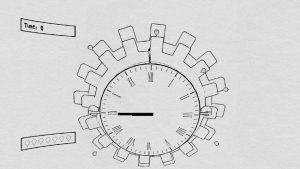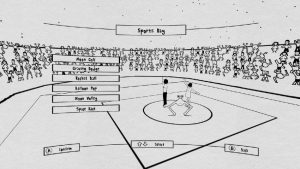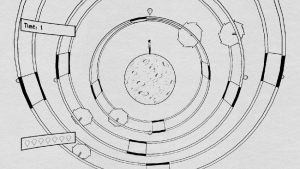It’s a weird thing to consider a monochrome art-style refreshing, but combined with the depth of details littered around Perfect Universe, it’s hard not to.
Perfect Universe is a collection of 9 titles, with three of them being single player experiences, and the other 6 being couch multiplayer titles which can be played with the AI or amigos. All of the titles feature the wonderful 2.5D, minimalistic, monochromatic art, all overlaid with absolutely amazing music.
Will Sykes Games, as you might guess, is a solo developer, having worked around the industry in various positions over the years [Moby Games Dev Sheet], and has launched several titles previously for handheld – including a predecessor of one of the games included in Perfect Universe, Perfect Moon, on mobile.

The single-player games are what make up the core of the title, with just over 80 levels between the three of them. After each level you’ll receive a rating, which works towards you unlocking the final sequence. 80 levels doesn’t sound like much, and in truth it’s not something that’ll phase you if your aim is to quickly nuke your way through a game – but the amount of care put into most of the levels make them very easy to return to and pick up and play again.

As a matter of fact, after I finished up a few levels I actually got up, left the room to find my wife, and brought her in to show her some of the levels – and there are some fantastic levels, such as a winding clock, a train on a loop around a small planet. And all of these levels, no matter the amount of spinning-death-saws, are powered by utterly simple – if unusual – mechanics which never seemed to drive me to frustration. I instead sat there laughing as I had to restart, after gliding a little too close to a saw, or jumping into the gaping maw of a worm.
Each of the three single player games plays on a different mechanic. Perfect Moon sees you jumping and gliding (!) around planets and their gravity fields, each of these planets are rarely much larger than the screen can show you, and you can run all the way around. As you run around these gravity-emitting-matters you maintain your own direction, meaning you’re using the controller’s sticks (it can be played on keyboard, but controller is more natural for pretty much all of the modes) in less than conventional manners, which takes some getting used to, but feels fantastic when you first glide from moon to moon in one swift sweep.
The second mode, Moon Life, follows Mr Legs. Mr Legs is a two legged alien thing which you control by using both analogue sticks, one for each leg. Once again, this is a mechanic which has been featured in games before, however the game feels perfectly suited to the control. Timing – as well as co-ordination – becomes key much like the other modes, as you jump into snapping maws or over various traps, to try and collect the items to finish the game.

Finally, for the single player games, is Star Light, in which you play a tiny, rampaging rocket. It’s a mechanic of balancing propulsion with direction that steers Star Light, as over-blasting with the boosters will see you sailing past your target, spinning as you try to swoop to hit – it’s moderation, or chaos for the small rocket. That said, collisions won’t kill you or cause you to detonate – as you might suspect – instead you are simply working against the clock to secure a good time as to get the sticks of dynamite you need for 100%.
Each of the three games mentioned, and each of their levels, feel wonderfully handcrafted and detailed – and it’s actually a little strange that each level then has a rating on it, considering the gameplay itself almost feels entirely without pressure, light and relaxed, like the rocket tumbling through the wind, or the human from Perfect Moon, gliding through space.
That, you see, is really the major issue with the single player aspect of the game. Each of the levels are well balanced, and well made, enough that you kind of hope for an increase in difficulty, albeit a very slow one across a great many levels. Instead we have a limited – albeit, as I keep saying, exceptional – amount of levels wherein the only real difficulty curve to work against comes from the time limits. Yes, they are excellent, but I had finished all of the levels with high scores, and played through each of the multiplayer modes with friends in less than the 2 hour refund period on Steam.
Had I have bought the game then I would have kept it, and not refunded. It is definitely something I will keep installed and replay when I’m looking for a calming, fun game – but the level of content, no matter how well made, does put it at risk from those who ride the buy-refund wave with titles.
Multiplayer
There are six titles within the Sports Day option of the main menu, each of these are playable against AI, or if you have amigos in proximity, in couch multiplayer.
Each of the titles expand on an area covered in the three single player titles. Space Race is a birds-eye race between up-to four of the rockets from Star Light, it’s a fun little ‘kart’ style minigame where you can barge your buddies out of the way as you try to juggle your speed and angle as to not grind to a half after smashing the side. Similarly Rocket Ball stars the same rockets, however it’s a 2D football match that you’re playing, over a variety of pitches, including a rather interesting one with three goals, made for a 1Vs1Vs1 match.

Balloon Pop sees the players/AI competing simultaneously as Mr Legs, having to jump and… pop balloons. It’s simple enough – and the awkward controls are fun enough – that it’s a fun and chaotic experience.
Moon Volley combines the gliding and jumping of Perfect Moon, with volley ball. This actually makes for a very fast paced and competitive game, as the pitch is spherical, and the ball can be angled as to glide and ride the gravity field of the moon. That said, this mode – like Gravity Dodge – does have a habit of requiring you to be able to press multiple sticks, and multiple buttons at the same time. It’s a shame that awkward controls let these two modes down, as the game does a great job of keeping it simple in all other areas. Gravity Dodge works on the same exact same controls, however in this game you are running around the inside of an object, all sharing the same screen, as you play a curious game of dodge ball, carefully picking when to throw your limited amount of balls, as to ensure you’re the first to get 10 hits.
Finally, is Moon Golf. As you will likely have guessed this is simply golf on peculiar lunar lands. What actually works out to making this stand out far ahead of the others, even though it’s the only one in which you’re taking turns, is that the levels are exceptionally detailed, on par with the core game. While the other modes are certainly fast, and fun, Moon Golf better encapsulates the single player games’ fantastic detail, and calm vibe. It’s also the only one in 2.5D, like the core single player games.

Other than sometimes requiring a few extra fingers in a couple of the games, the only real flaw to be found is the confusion of sharing a screen between four players in a monochrome world – this is a major problem on Gravity Dodge, and Rocket Ball, where the screen is shared, and players regularly overlap each other. A quick fix to this might come in keeping the player number over their head, although that would pollute the simplicity of the game.
A final thing worth mentioning, before I wrap up this review, is that at the end of each of the single player modes, there are what feel like an infinite crawl experience as the character you’ve been playing as heads towards their final destination. While these each actually wind up being very short, around 40 seconds, they’re actually quite fun to return back to and replay – and it’s actually a shame they are not available as survival modes in the game. Hopefully this is the kind of thing the developer might add in future.
In closing, Perfect Universe is a fantastic collection of 9 mini games, some single player and some not, but all of them easy to pick up and play, set in simple, clean worlds with excellent music, all made by a single developer.